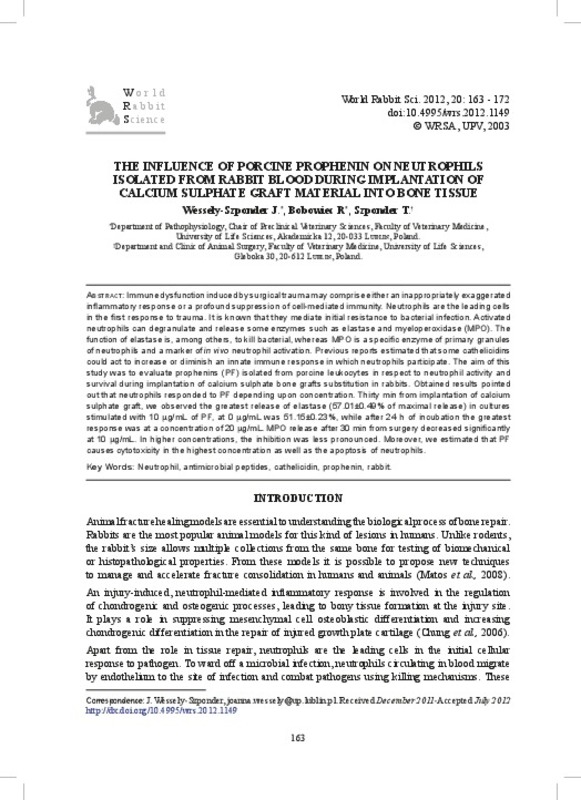JavaScript is disabled for your browser. Some features of this site may not work without it.
Buscar en RiuNet
Listar
Mi cuenta
Estadísticas
Ayuda RiuNet
Admin. UPV
The influence of porcine prophenin on neutrophils isolated from rabbit blood during implantation of calcium sulphate graft material into bone tissue
Mostrar el registro sencillo del ítem
Ficheros en el ítem
| dc.contributor.author | Wessely-Szponder, Joanna
|
es_ES |
| dc.contributor.author | Bobowiec, Ryszard
|
es_ES |
| dc.contributor.author | Szponder, Tomasz
|
es_ES |
| dc.date.accessioned | 2012-10-05T10:46:35Z | |
| dc.date.issued | 2012 | |
| dc.identifier.issn | 1257-5011 | |
| dc.identifier.uri | http://hdl.handle.net/10251/17424 | |
| dc.description.abstract | [EN] Immune dysfunction induced by surgical trauma may comprise either an inappropriately exaggerated inflammatory response or a profound suppression of cell- mediated immunity. Neutrophils are the leading cells in the first response to trauma. It is known that they mediate initial resistance to bacterial infection. Activated neutrophils can degranulate and release some enzymes such as elastase and myeloperoxidase (MPO). The function of elastase is, among others, to kill bacterial, whereas MPO is a specific enzyme of primary granules of neutrophils and a marker of in vivo neutrophil activation. Previous reports estimated that some cathelicidins could act to increase or diminish an innate immune response in which neutrophils participate. The aim of this study was to evaluate prophenins (PF) isolated from porcine leukocytes in respect to neutrophil activity and survival during implantation of calcium sulphate bone grafts substitution in rabbits. Obtained results pointed out that neutrophils responded to PF depending upon concentration. Thirty min from implantation of calcium sulphate graft, we observed the greatest release of elastase (57.01±0.49% of maximal release) in cultures stimulated with 10 mg/ml of PF, at 0 mg/ml was 51.15±0.23%, while after 24 h of incubation the greatest response was at a concentration of 20 mg/ml. MPO release after 30 min from surgery decreased significantly at 10 mg/ml. In higher concentrations, the inhibition was less pronounced. Moreover, we estimated that PF causes cytotoxicity in the highest concentration as well as the apoptosis of neutrophils. | es_ES |
| dc.language | Inglés | es_ES |
| dc.publisher | Editorial Universitat Politècnica de València | es_ES |
| dc.relation.ispartof | World Rabbit Science | |
| dc.rights | Reserva de todos los derechos | es_ES |
| dc.subject | Neutrophil | es_ES |
| dc.subject | Antimicrobial peptides | es_ES |
| dc.subject | Cathelicidin | es_ES |
| dc.subject | Prophenin | es_ES |
| dc.title | The influence of porcine prophenin on neutrophils isolated from rabbit blood during implantation of calcium sulphate graft material into bone tissue | es_ES |
| dc.type | Artículo | es_ES |
| dc.date.updated | 2012-10-05T10:24:59Z | |
| dc.identifier.doi | 10.4995/wrs.2012.1149 | |
| dc.rights.accessRights | Abierto | es_ES |
| dc.description.bibliographicCitation | Wessely-Szponder, J.; Bobowiec, R.; Szponder, T. (2012). The influence of porcine prophenin on neutrophils isolated from rabbit blood during implantation of calcium sulphate graft material into bone tissue. World Rabbit Science. 20(3):163-172. https://doi.org/10.4995/wrs.2012.1149 | es_ES |
| dc.description.accrualMethod | SWORD | es_ES |
| dc.relation.publisherversion | https://doi.org/10.4995/wrs.2012.1149 | |
| dc.description.upvformatpinicio | 163 | |
| dc.description.upvformatpfin | 172 | |
| dc.description.volume | 20 | |
| dc.description.issue | 3 | |
| dc.identifier.eissn | 1989-8886 | es_ES |








